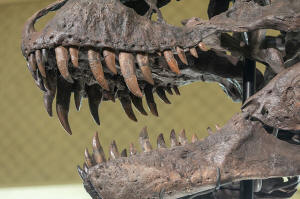T. Rex is at the center of a debate over dinosaur intelligence
 Send a link to a friend
Send a link to a friend
 [May 01, 2024]
By Will Dunham [May 01, 2024]
By Will Dunham
WASHINGTON (Reuters) - Surmising even the physical appearance of a
dinosaur - or any extinct animal - based on its fossils is a tricky
proposition, with so many uncertainties involved. Assessing a dinosaur's
intelligence, considering the innumerable factors contributing to that
trait, is exponentially more difficult.
A study published last year by Vanderbilt University neuroscientist
Suzana Herculano-Houzel that evaluated the intelligence of Tyrannosaurus
Rex, focusing upon estimated brain size and the number of brain neurons,
as comparable to that of primates - specifically a baboon - caused a
stir in scientific circles.
Now, an interdisciplinary scientific team has published a study in
rebuttal, questioning Herculano-Houzel's methodology and challenging her
appraisal of the smarts of T. Rex and other big dinosaur predators in
the dinosaur clade called theropods.
They instead suggested a more holistic approach to assess the braininess
of Tyrannosaurus or any extinct animal, with brain size and neuronal
count considered alongside other factors such as an animal's anatomy and
ecology, data from living relatives, and fossil evidence about how it
moved about and fed that offer insight into its life.

"Our key findings are that the brains of most dinosaurs, including T.
rex, were comparable in relative size to those of living reptiles, such
as crocodiles and alligators. Furthermore, their neuron numbers were
likely not exceptional, especially for animals of their body mass," said
zoologist Kai Caspar of Heinrich Heine University in Germany, who
studies the behavior of living animals and was the lead author of the
study published this week in The Anatomical Record journal.
"What needs to be emphasized is that reptiles are certainly not as
dim-witted as is commonly believed," Caspar added. "Their behaviors can
be very complex, and the experimental data we have point to many
cognitive similarities between them, mammals and birds. So whereas there
is no reason to assume that T. Rex had primate-like habits, it was
certainly a behaviorally sophisticated animal."
Herculano-Houzel said she stands by her findings and called the new
analysis flawed.
"The only thing that is under dispute is what already was at the time of
my study: what was actually the size of dinosaur brains. Even then,
we're talking about the difference between a T. Rex brain being baboon-
or monkey-sized," Herculano-Houzel said.
"Their conclusion hinges on a single extremely important point:
whether theropods like T. Rex shared their (brain-to-body size)
relationship with their extant warm-blooded ostrich and chicken
cousins, or with their more distant living relatives, crocodiles. I
said the former, because I compared theropods to ostriches and
chickens; they now say the latter," Herculano-Houzel added.

[to top of second column]
|

A 67-million-year-old T. Rex skeleton named "TRX-293 TRINITY
Tyrannosaurus" is seen during a preview at Koller auction house in
Zurich, Switzerland March 29, 2023. REUTERS/Denis Balibouse/File
Photo

Caspar said the comparison to modern birds also was an integral part
of the new study.
'NOT A TRIVIAL QUESTION'
There are problems in trying to gauge intelligence from brain neuron
count, Caspar said.
"The first obstacle is to estimate the actual size of the brain of
the extinct animal in question. This is not a trivial question in
dinosaurs. While the brain fills almost the entire skull cavity in
birds and us mammals, this is not the case for reptile species, the
brain of which fills only about 30-50% of the skull cavity," Caspar
said.
"The 2023 study assumed a 100% fill in dinosaurs such as T. Rex, and
that was certainly not the case," Caspar added.
It is unknown how densely packed the neurons were in dinosaur
brains, Caspar said.
"However, looking at living animals, we see that neuron counts are
actually not a good indicator of intelligence in the first place,
although that might appear intuitive at first glance," Caspar added.
The dinosaurs, aside from their bird descendants, disappeared 66
million years ago after an asteroid struck Earth. In two centuries
of scientific study, dinosaurs are coming into better focus, though
plenty of uncertainties remain about Tyrannosaurus and the others.
"Given the brain size we found for it, Tyrannosaurus probably
occupied a level of intelligence we don't see in the modern world:
more intelligent than crocodilians, but less intelligent than
typical living birds and mammals," said University of Maryland
paleontologist Thomas Holtz, a co-author of the new study.
"Intelligence is one of the most difficult things to measure even in
modern animals, and many of our common assumptions don't really hold
up when you actually examine what real animals do in the real
world," Holtz said.

"So when we try to estimate the intelligence and cognition of
ancient animals, we are going to have some difficulties. It would be
nice if we could just estimate one number and unravel the whole
complexity of an animal's biology and lifestyle, but nature isn't
like that."
(Reporting by Will Dunham, Editing by Rosalba O'Brien)
[© 2024 Thomson Reuters. All rights reserved.]This material
may not be published, broadcast, rewritten or redistributed.
Thompson Reuters is solely responsible for this content. |